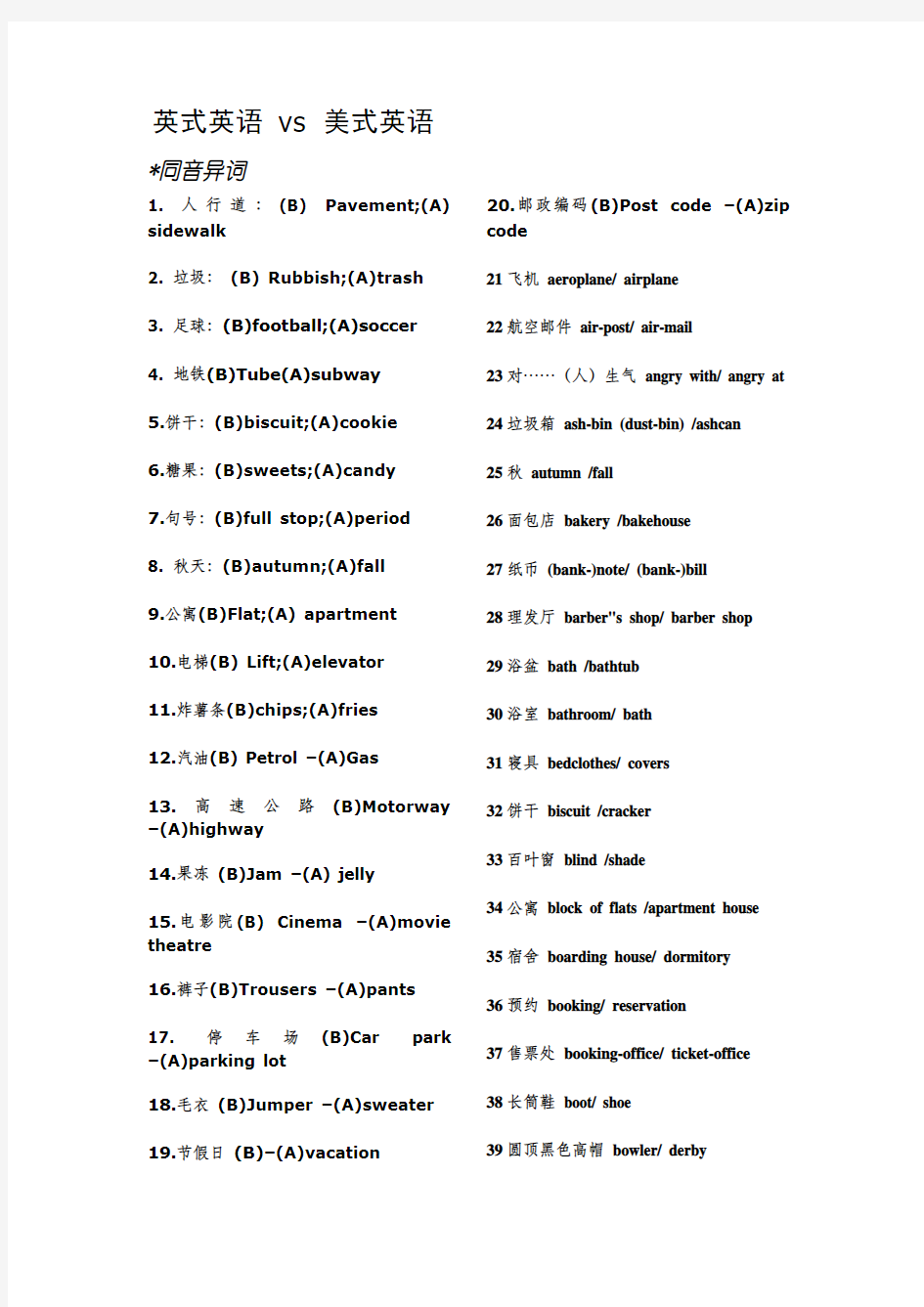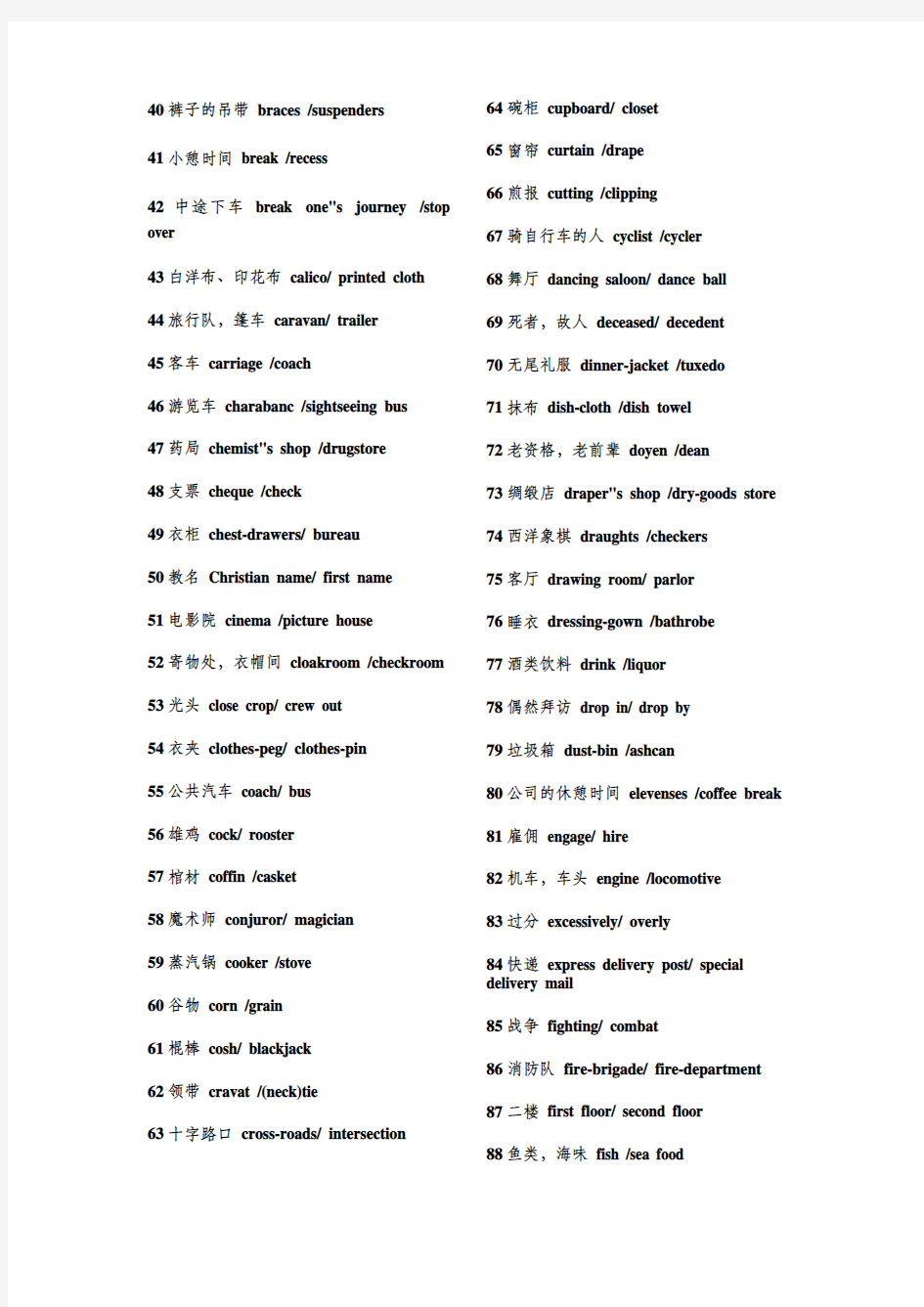英式英语和美式英语的差异


英式英语vs 美式英语*同音异词
1. 人行道:(B) Pavement;(A) sidewalk
2. 垃圾:(B) Rubbish;(A)trash
3. 足球:(B)football;(A)soccer
4. 地铁(B)Tube(A)subway
5.饼干:(B)biscuit;(A)cookie
6.糖果:(B)sweets;(A)candy
7.句号:(B)full stop;(A)period
8. 秋天:(B)autumn;(A)fall
9.公寓(B)Flat;(A) apartment
10.电梯(B) Lift;(A)elevator
11.炸薯条(B)chips;(A)fries
12.汽油(B) Petrol –(A)Gas
13.高速公路(B)Motorway –(A)highway
14.果冻(B)Jam –(A) jelly
15.电影院(B) Cinema –(A)movie theatre
16.裤子(B)Trousers –(A)pants
17. 停车场(B)Car park –(A)parking lot
18.毛衣(B)Jumper –(A)sweater
19.节假日(B)–(A)vacation 20.邮政编码(B)Post code –(A)zip code
21飞机aeroplane/ airplane
22航空邮件air-post/ air-mail
23对……(人)生气angry with/ angry at 24垃圾箱ash-bin (dust-bin) /ashcan
25秋autumn /fall
26面包店bakery /bakehouse
27纸币(bank-)note/ (bank-)bill
28理发厅barber"s shop/ barber shop
29浴盆bath /bathtub
30浴室bathroom/ bath
31寝具bedclothes/ covers
32饼干biscuit /cracker
33百叶窗blind /shade
34公寓block of flats /apartment house
35宿舍boarding house/ dormitory
36预约booking/ reservation
37售票处booking-office/ ticket-office
38长筒鞋boot/ shoe
39圆顶黑色高帽bowler/ derby
40裤子的吊带braces /suspenders
41小憩时间break /recess
42中途下车break one"s journey /stop over
43白洋布、印花布calico/ printed cloth
44旅行队,篷车caravan/ trailer
45客车carriage /coach
46游览车charabanc /sightseeing bus
47药局chemist"s shop /drugstore
48支票cheque /check
49衣柜chest-drawers/ bureau
50教名Christian name/ first name
51电影院cinema /picture house
52寄物处,衣帽间cloakroom /checkroom 53光头close crop/ crew out
54衣夹clothes-peg/ clothes-pin
55公共汽车coach/ bus
56雄鸡cock/ rooster
57棺材coffin /casket
58魔术师conjuror/ magician
59蒸汽锅cooker /stove
60谷物corn /grain
61棍棒cosh/ blackjack
62领带cravat /(neck)tie
63十字路口cross-roads/ intersection 64碗柜cupboard/ closet
65窗帘curtain /drape
66煎报cutting /clipping
67骑自行车的人cyclist /cycler
68舞厅dancing saloon/ dance ball
69死者,故人deceased/ decedent
70无尾礼服dinner-jacket /tuxedo
71抹布dish-cloth /dish towel
72老资格,老前辈doyen /dean
73绸缎店draper"s shop /dry-goods store 74西洋象棋draughts /checkers
75客厅drawing room/ parlor
76睡衣dressing-gown /bathrobe
77酒类饮料drink /liquor
78偶然拜访drop in/ drop by
79垃圾箱dust-bin /ashcan
80公司的休憩时间elevenses /coffee break 81雇佣engage/ hire
82机车,车头engine /locomotive
83过分excessively/ overly
84快递express delivery post/ special delivery mail
85战争fighting/ combat
86消防队fire-brigade/ fire-department 87二楼first floor/ second floor
88鱼类,海味fish /sea food
89鱼贩fish-monger/ fish-dealer
90花线,皮线flex /electric cord
91人行道footway /side walk
92空格表form /blank
93二星期fortnight /two weeks
94句点full stop/ period
95橡皮套鞋galoshes/ rubbers
96监狱gaol/ jail
97再见good-bye/ good-by
98货车goods train/ freight train
99卡车goods waggon /freight car
100食品杂货店grocer"s shop/ grocery store
101一楼ground floor /first floor
102车掌guard /conductor
103长筒橡皮套鞋overshoes /gum boots 104大炮cannon/ gun
105争价,还价haggle/ dicker
106一半half a / a half
107门厅,回廊hall/ hallway
108长筒靴high boot/ boot
109休假holiday /vacation
110旅馆的侍者hotel page/ bellboy
111有病的ill /sick
112旅馆主人innkeeper /innholder
113演出休息时间interval/ intermission 114铁器店ironmonger"s/ hardware store 115水罐jug /pitcher
116街道的边石kerb/ curb
117邮票,印花税票label /sticker
118标签label/ tag
119化妆室ladies" cloakroom /powder room
120地崩,山崩landslip /landslide
121厕所lavatory/ washroom
122电梯,升降机lift /elevator
123铁路line/ road
124寄宿者lodger /roomer
125卡车lorry /truck
126西装lounge suit /sack coat
127行李luggage /baggage
128主要街道,大路main road /highway 129玉米maize /corn
130汽车(motor)car /auto(mobile)
131市政厅municipal office/ city hall
132音乐厅,演艺馆music hall/ variety house
133棉布muslin /calico
134零naught, nought zero
135通讯社news-agent/ news-dealer
136单据夹note-case /billfold
137告示notice/ bulletin
138校友lod boys (girls)/ alumni
139大衣,外套overcoat/ topcoat
140(纸牌的)一组pack (of cards) /deck 141内裤,短裤pants /shorts
142小包,包裹parcel /package
143挂布pelmet/ valance
144婴儿车perambulator/ pram baby carriage
145也许perhaps /maybe
146汽油petrol/ gasoline
147电影pictures/ movies
148邮筒pillar-box /letter-box
149(电器)接头point /outlet
150转辙手pointman /switchman
151职业的professional /career
152公共电话public call-box/ pay station 153酒馆,酒店public house /tavern
154(车胎等)爆坏puncture /become flat 155钱包,皮夹purse/ pocket-book
156睡衣pyjamas/ pajamas
157赛马场race course /racetrack
158铁路railway/ railroad
159火车站railway station /depot
160电冰箱refrigerator/ icebox
161来回车票return ticket /round-trip ticket 162挂断电话ring off/ hang up
163打电话ring up/ call
164人行道roadway/ pavement
165圆环roundabout rotary, traffic circle
166垃圾堆rubbish-heap/ trash heap
167围毯rug/ robe
168解雇sack/ fire
169大麦饼scone/ biscuit
170海sea/ ocean
171定期票,长期票seaon ticket
/commutation ticket
172抵押security/ collateral
173鞋子shoe/ oxford
174擦皮鞋shoe-black /boot-black
175商店shop /store
176店员shop assistant/ clerk
177女店员sjpp-girl /salesgirl
178颊发side-shiskers/ sideburns
179单程车票single ticket/ one-way ticket
180在周末at th eweekend/on the weeke
181行李baggage /luggage(a piece of baggage(或luggage),two pieces of baggage 等。baggage car(行李车)英国人则说luggage van。)
182罐头tinned goods-Canned goods
*同词异义:
相同词既出现在美国英语中,也出现在英国英语中,但分别表示完全不同的概念。例如:例词BE AE
biscuit 苏打饼干软饼
billion 万亿十亿
overall 紧身裤工装裤
*发音:
讲美式英语的人就会发很清楚的卷舌音,英式英语不这样。(美英中只要有r就得卷舌)
ar:除了轻读短音(如singular)和者后连元音(如clarity),英语的ar全部清一色的长音[a:],而美语中,是“阿尔”。事实上,凡是有r在一个音节尾部的时候,美英发音通常都是不一样的,如tour(英:吐啊,美:吐儿),tear(英:踢啊,美:踢儿),pair(英:pe啊,美:pe儿)。甚至在刚才提到的clarity中,英语['kleriti],美语['kle儿r(er)ti]
以wh开头的词,美式英语读[hw], 英式英语则读[w],例如:where[hw?/w?]、
while[hwail/wail]、white[hwait/wait]等。美式英语把-u-和-ue的长元音发作[u:],而英式英语发成[ju:],例如:
due[du:/dju:]、
reduce[ri′du:s/ri′dju:s]、
tube[tu:b/tju:b]等。美式英语把-a-读成[?],而英式英语读成[a或a:],例如:
craft[kr?ft/kraft]、half[h?f/ha:f]、laugh[l?f/la:f]等。
另一个比较明显的区别是d和t。在一部分非重读音节中(如paddle,rattle, actuality),英语会清楚地发音这两个字母,但在美语中d和t常常会被模糊成一个很难解释的音,
一是[o]音:短音的o(如often),英语中发音仅仅为一个缩短了的长音o(如or),而美式的短音o听起来和英语的短音[/\]
很像,同时长音o后面如果有r都通常像上一段里说的那样儿化了,没有的话(如plausible, applause)就自动变成了一个短音的o的发音。
ate [et ][eit ]
been [bi:n ][bin ]
idyll [ˊidil][ˊaidl]
z [zed ][zi ]
1、懒元音美国人发[a],[e],[i],[o],这些元音没有英式区别明显,特别是轻声元音,他们不会为发o音把口弄圆,为u音把嘴撅长,也不为i音把唇拉平,所有这些几乎都向最容易发的[?]音靠拢,比如choose和cheese差不多,family不读['f?mili]而读['f?m?li],promise不读[promis]而读[prom?s]。
2、喜欢把半元音[j],[w],及次声元音省略掉,比如new,knew读[nu:],Renfrew读[renfru:];forest把后面的i音省掉读成[fo:rst]而不是[fo:rist],Jeremy读[dЗermi]而不是[dЗeremi]。
3、滥用失去爆破音,英式中只有单词开头
的st,sk,sp中的t,k,p音失去爆破改读d,g,b,而美式的t,k,p,tr等几个音,不论在字头字尾,只要前面接s,甚至是接ci,si,se,ce等音节,就一律失去爆破。比如city中的t因为前面有[si]音而读成[d],即[sidi];second中的
c(k音)因为前面有[se]音也变成了[g]音,即[seg?nd]……而这些发音在英式中因为不是
紧跟s而仍读[siti],[sek?nd]。
4、单词后部的t读成[d]音,letter, water, seattle, dirty……,只要t不在字头,大胆把它读作d音准
没错!p也有读成b音的现象,不过没t这么严重,多见于双写pp之情况,如slipper。
在第一音节上,而英式英语则把重音放在第二个音
节上,例如:ˊancillary/anˊcillary、
ˊlaboratory/laˊboratory、ˊmigrate/miˊgrate 等
*拼写:
英式英语 -re 结尾,美式英语为 -er
例如:中心 = centre vs. center,戏院 = theatre vs. theater,纤维 = fibre vs. fiber
英式英语 -our 结尾,美式英语为 -or
例如:
颜色 = colour vs. color,劳动 = labour vs. labor (出现在学术词汇表 Sublist 1) 幽默 = humour vs. humo,荣誉 = honour vs. honor
港口 = harbour (Pearl Harbour 珍珠港) vs. harbor
英式英语 -ise, isation 结尾的,美式英语为 -ize, -ization
例如:
明白、了解 = realise vs. realize,组织= organise vs. organize
专门 = specialise vs. specialize
BE AE
biscuit 苏打饼干软饼
billion 万亿十亿
overall 紧身裤工装裤
其他出现在学术词汇表内的有
Sublist 1: analyse (分析), conceptualise (概念化), contextualise (情境化), individualised (个别化) Sublist 2: computerise, categorization, finalise, institutionalize, normalise Sublist 3: emphasise, maximize, philosophise
Sublist 4: internalize, summarise, hypothesise
Sublist 5: externalize, liberalise, stabilization, symbolize
Sublist 6: neutralization, rationalization, subsidise, utilised Sublist 7: globalisation, prioritisation
Sublist 8: dramatise, minimized, visualise
Sublist 9: minimalisation, revolutionise
英式英语字尾 -ce,美式英语为 -se
例如:
licence (执照) vs. license,defence (防守) vs. defense
英式英语在美式英语里被简化
programme (节目) 变成program,omelette (煎蛋卷) 变成omelet,catalogue (目录) 变 catalog,labelling (标示) 变成labeling (学术词汇Sublist 4), parallelled (平行) 变成paralleled (在 Sublist 4), paneled (用嵌板装饰) 变成 paneled (Sublist 10), storey 变成story, traveller 变成traveler, analogue (类比) 变成 analog 等。其他的拼法差异还有
英式英语用 ageing, cheque (支票;检查), draught, grey (灰色), judgement (判断), pyjamas (睡衣), plough, sulphate, mould, tyre 美式英语则用 aging, check, draft , gray, judgment, pajamas, plow, sulfate, mold, tire。意思是完全一样的,只是语言习惯上有些不同
比如:
在美语里,问你有……吗?用Do you have ……?
而在英语里,用Have you ……?
*其他口音的补充
澳洲口音:澳洲口音和英国口音大部分很像,不过澳洲人发[ei]音全部发成[ai],也就是,即使他们最常用的词儿mate,都说成[mait](像might)。
埃及口音:埃及口音的英语听起来和埃及口音的阿拉伯语很像。另外,用弹音发r也被使用。
印度口音:印度口音和英国口音比较相似,带了些泥巴味儿,不过现在的印度人开始倾慕美国口音了(印度人特崇洋媚外,排的电影全是关于在发达国家的富裕美丽年轻的印度移民)。
香港口音:没有对香港同胞污蔑的意思,不过香港口音听起来和粤语差不多,发音非常的重,同时带了英国口音的味道。很多人发不出th音,说不出three就说free.
南非口音:没听过。
英国乡土音:英国自己的口音都众多,不过共同的特征是h常常不发,并且连音特多。美国北方口音:以夸张的o音出名,如talk, walk, off, coffee这四个词,纽约市人会发成:twok, wok, woff, kwoffee(这里的o均为长音“喔”)。
*语法:
在某些情况下,尤其是在表达提供消息的时候,美式英语用一般过去时,而英式英语用现在完成时,例如:He just went home./He has just gone home。(他刚回家了。)、I just have lunch./I have just had lunch。(我刚吃完午餐。)等。在美式英语中“need, dare, used to”都作为实义动词使用,而在英式英语中它们都被当作情态动词使用,例如:She didn’t dare to
stay in the dark./She dared not stay in the dark。(她不敢呆在黑暗的地方。)、Tom doesn’t need to go wit h them./Tom needn’t go with them。(汤姆不需要和他们一起去。)等示距现在不远的过去所发生或完成的事情,英国英语常用现在完成时,则美国英语则倾向于使用一般过去时。
*其他:
对于某些名词美式英语用复数形式,而英式英语用单数形式,例如:entertainments/entertainment(乐趣) 、sports/sport(运动)、 stands/stand(看台)等。
在某些词组或习语中,美式英语和英式英语的介词用法不同,例如:on the weekend/at the weekend(在周末)、around midnight/about midnight(约在半夜)、on the train/in the train(在火车上) 等。
在某些表示抽象概念的地点名词前,美式英语用定冠词,而英式英语不用,例如:be in the hospital/be in hospital(在医院)、go to the university/go to university(上大学)等;但在某些表示时间的习语中,美式英语不用定冠词,而英式英语要用,例如:all morning/ all the morning(整个上午)、day after tomorrow/the day after tomorrow(后天)
*美国人得连读
美国人常会连音,因此,"Whaddaya say?" 不是一个字一个字被念成"What did you say?" 而gonna (= going to)、wanna (= want to)、smilin' (= smiling) 或shinin' (= shining)
gotta是什么意思
gotta的原型是have got to,表示“必须”、“要”等意思。如I gotta run等同于I have got to run意思是我要走了。
gonna是什么意思gonna的原型是going to,表示“将要”的意思。如I am gonna leave相当于I am going to leave意思是我要离开了。
wanna是什么意思
wanna的原型是want to,表示“想要做某事”的意思。如I wanna go shopping相等于I want to go shopping意思是我想去逛街。
其实wanta的原型是want a或者want an。如I wanta apple等同于I want an apple。
gimme=give me
oughta=ought to
yep/yup=yes, yeah
kinda=kind of
星期
星期一:MONDAY=MON 星期二:TUESDAY=TUS
星期三:WENSEDAY=WEN 星期四:THURSDAY=THUR
星期五:FRIDAY=FRI 星期六:SATURDAY=SAT 星期天:SUNDAY=SUN
月份
一月份=JAN 二月份=FEB
三月份=MAR 四月份=APR
五月份=MAY 六月份=JUN
七月份=JUL 八月份=AUG
九月份=SEP 十月份=OCT
十一月份=NOV 十二月份=DEC
thanks ——thx
——gonna
——wanna
can not ——cannot
beacuse——becoz(coz)
you——u
love——luv
to——2
for——4
and so on——etc
don't know---dunno
np=no problem
icq=i seek you
ASAP=as soon as possible
aka: also known as (介绍别名用) please=pls.
number=NO.
